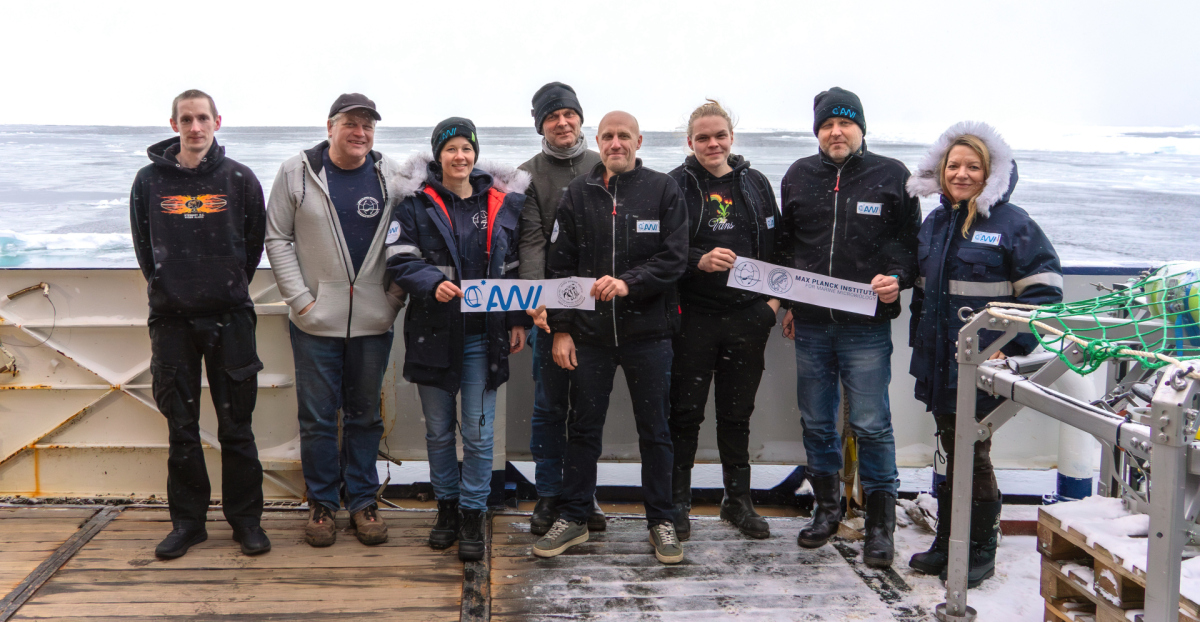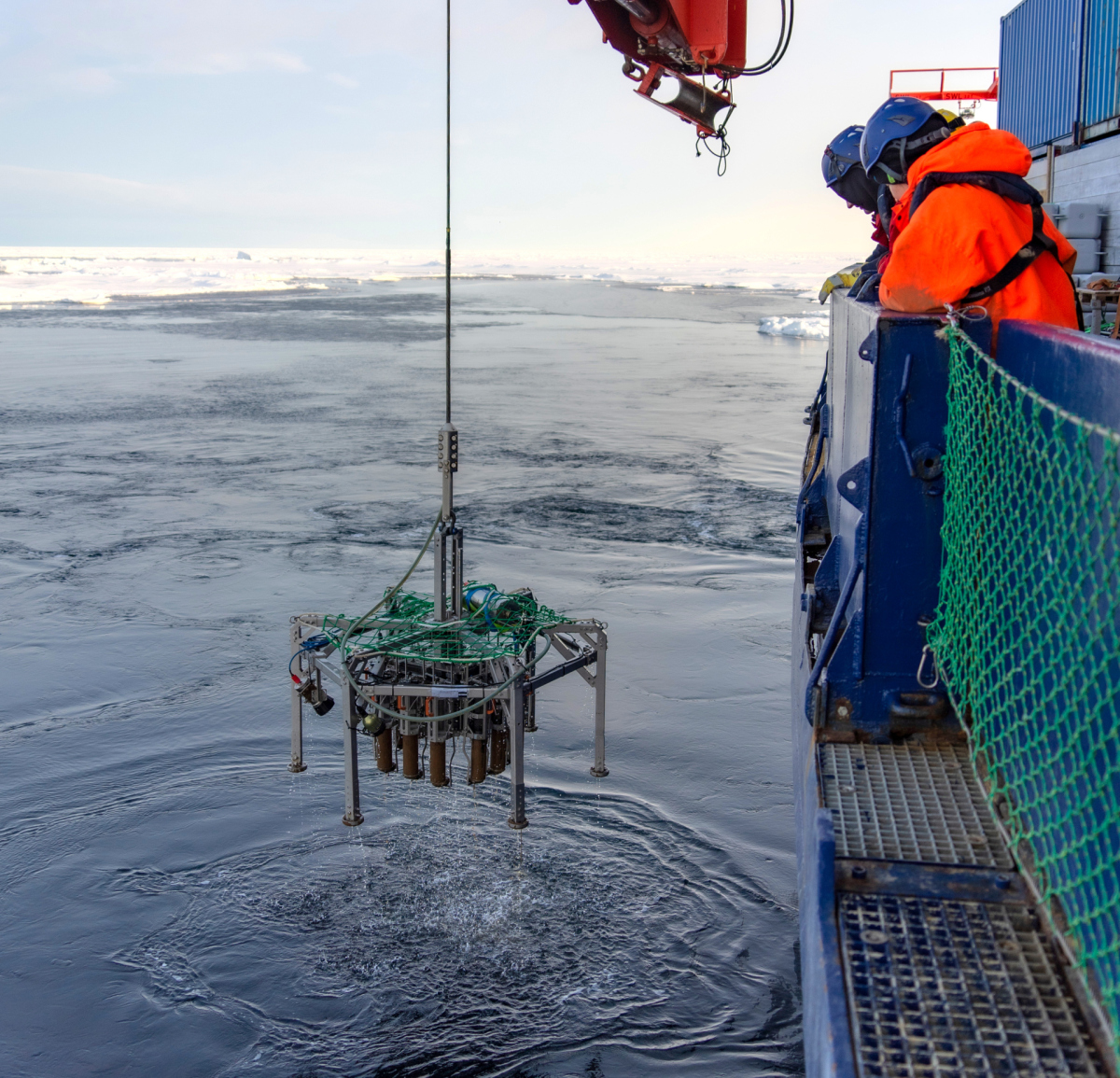- Press Office
- Press releases
- Polarstern reaches North Pole
Polarstern reaches North Pole – MPI-scientists on board

From left to right: Jakob Barz, Axel Nordhausen, Christina Bienhold, Felix Janssen, Matthias Wietz, Ruben Schulte-Hillen, Frank Wenzhöfer, Antje Boetius. (Photo: Frederic Tardeck)
The expedition ArcWatch-1 (PS138) with the Alfred Wegener Institute's research vessel Polarstern is led by Antje Boetius, director of the Alfred Wegener Institute, Helmholtz Centre for Polar and Marine Research (AWI) and Group Leader of the HGF-MPG Joint Research Group for Deep-Sea Ecology and Technology at the Max Planck Institute for Marine Microbiology (MPIMM) in Bremen.
The team of researchers associated with the Max Planck Institute for Marine Microbiology, including expedition leader Antje Boetius, Frank Wenzhöfer, Felix Janssen, Axel Nordhausen, Matthias Wietz and Christina Bienhold, focuses on the investigation of spatial and temporal changes in the diversity and function of microbial communities at the Arctic deep-sea floor in regions of varying sea-ice cover. The team uses a camera-guided multiple corer to retrieve undisturbed seafloor samples from over four kilometres water depth, and moored lander systems for the in situ assessment of benthic oxygen fluxes to assess the carbon mineralization efficiency in Arctic deep-sea sediments. In addition, the MPIMM-team samples sea ice and the water column to characterize the microbial diversity and functional ecology in these different Arctic Ocean compartments.
One of the many highlights of the expedition to date happened when the researchers were able to survey a 2500 meter high, previously unmapped seamount. Its base lies at a depth of 4000 meters, and its peak reaches 1500 meters below the sea surface. “The top of the seamount was teeming with life,” says expedition leader Antje Boetius. “We found huge sponges here, some close to half a meter in size, which were over and over populated with worms, crabs and soft corals. But very surprisingly for us, we also came across countless fish, eelpout and snailfish, which are known for their antifreeze proteins. We were delighted by the beautiful apricot-colored and almost half-meter sea anemones.”
Another goal of the expedition is to make comparisons with earlier studies from 2012, as well as with studies from the MOSAiC expedition 2019-2020. In 2012, the team - also led by AWI Director and MPIMM-Group Leader Antje Boetius - was underway with Polarstern during the largest sea ice melt since satellite records began. Over a huge area, sea ice life fell into the water and sank into the deep sea - especially the filamentous endemic sea ice diatom algae Melosira arctica. Decomposition of these algal carpets by seafloor bacteria created oxygen minima in the Arctic seafloor. The team has now been able to determine, eleven years later, that the repeated melting of sea ice algae in recent years has changed the composition of the seafloor community: formerly dominant species such as brittle stars have disappeared, but there are significantly more annelids, bristle worms and sea cucumbers. However, this year the ice algae Melosira arctica is absent from large areas of the study area, both under the ice and on the seafloor.
On September 7, the AWI research vessel reached the North Pole on schedule. It is the seventh time in total that in its 42-year history the research icebreaker Polarstern visits the northernmost point of Earth. The work, which will last several days, began with a dive to the geographic pole at 90°N in 4224 m water depth. Currently, the scientists are setting up their observatories on the ice floe, in the ocean and on the seafloor. They will then continue their research southwards along 60°E longitude. Polarstern is expected back in Bremerhaven on October 1, 2023.
A camera team from UFA Documentary GmbH will be filming the expedition. The television documentary, which is being produced in cooperation with NDR, is scheduled to be broadcast on ARD at the turn of the year. Already during the expedition, impressions from on board are available by tuning in to the expedition-associated radio program on Radio Bremen and of course anyone may follow the expedition in the Polarstern web app and on the social media channels of the Alfred Wegener Institute.
This press release is based on a press release by the Alfred Wegener Institute.
The Alfred Wegener Institute pursues research in the polar regions and the oceans of mid and high latitudes. As one of the 18 centres of the Helmholtz Association it coordinates polar research in Germany and provides ships like the research icebreaker Polarstern and stations for the international scientific community.
Participating institutes and companies on board:
Alfred Wegener Institute, Helmholtz Centre for Polar and Marine Research
Albert Ludwig University Freiburg
Dartmouth College
DRF Luftrettung gAG
Fielax - Gesellschaft für wissenschaftliche Datenverarbeitung mbH
German Weather Service
MARUM - Center for Marine Environmental Sciences of the University of Bremen
Max Planck Institute for Marine Microbiology
Northern HeliCopter GmbH
Otto von Guericke University Magdeburg
Senckenberg Society for Nature Research
Tim Kalvelage (Freelance science journalist)
UFA Documentary GmbH
University of Bremen
University of Colorado Boulder
University of Exeter
University of Southern Denmark
University of Tasmania (UTAS)
University of Tokyo
MPIMM Press Office
Head of Press & Communications
MPI for Marine Microbiology
Celsiusstr. 1
D-28359 Bremen
Germany
|
Room: |
1345 |
|
Phone: |

